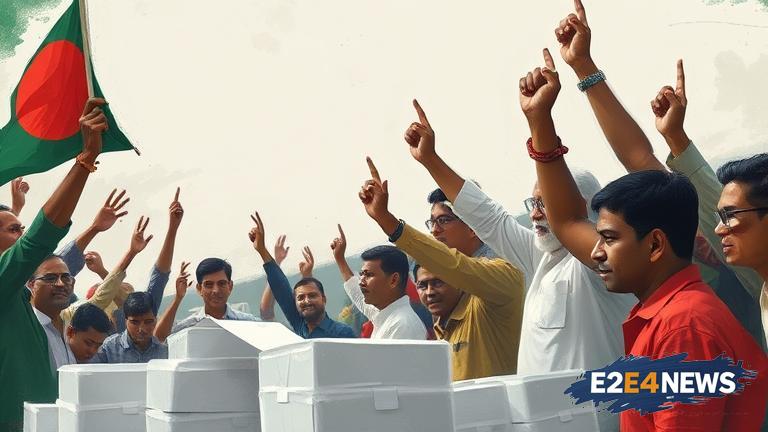The upcoming Bangladesh elections have sparked intense debate and discussion, with many stakeholders weighing in on the importance of a free and fair poll. Nobel laureate Muhammad Yunus, a renowned economist and social entrepreneur, has emphasized the need for a democratic roadmap that prioritizes the will of the people. According to Yunus, the elections provide a crucial opportunity for Bangladesh to reaffirm its commitment to democracy and the rule of law. The country has made significant strides in recent years, with impressive economic growth and poverty reduction. However, the path to democracy has been fraught with challenges, including allegations of vote rigging and suppression of opposition voices. Yunus has called for a level playing field, where all parties can participate freely and fairly. He has also emphasized the importance of an independent election commission, which can ensure the integrity of the poll. The Bangladesh government has faced criticism for its handling of the election process, with many opposition parties alleging that the ruling party is seeking to manipulate the outcome. Despite these challenges, Yunus remains optimistic about the potential for democracy to flourish in Bangladesh. He has pointed to the country’s vibrant civil society and the enthusiasm of its young people as key factors that can drive positive change. The international community has also been watching the Bangladesh elections closely, with many countries and organizations calling for a free and fair poll. The United States, the European Union, and the United Nations have all emphasized the importance of democratic principles and the rule of law. The Bangladesh elections are also being seen as a test for the country’s relations with its neighbors, particularly India. The two countries have a long and complex history, with many areas of cooperation and contention. The outcome of the elections is likely to have significant implications for regional stability and security. In recent years, Bangladesh has made significant progress in areas such as economic development and social welfare. However, the country still faces many challenges, including poverty, inequality, and climate change. The elections provide an opportunity for the country to reaffirm its commitment to democratic values and the rule of law. Yunus has emphasized the importance of a long-term perspective, where the focus is on building a stable and prosperous future for all Bangladeshis. He has also called for greater investment in education and healthcare, which are critical for driving economic growth and reducing poverty. The Bangladesh elections are a crucial test for democracy, not just in the country but also in the region. The outcome will have significant implications for the future of democracy and the rule of law in South Asia. As the country prepares to go to the polls, there is a sense of excitement and anticipation. Many Bangladeshis are eager to exercise their right to vote and have their say in the country’s future. The international community is also watching closely, with many countries and organizations calling for a free and fair poll. In the end, the outcome of the elections will depend on the will of the Bangladeshi people. It is up to them to decide the future of their country and to ensure that the democratic process is upheld. The world is watching, and the stakes are high. The Bangladesh elections are a crucial test for democracy, and the outcome will have significant implications for the future of the country and the region.
